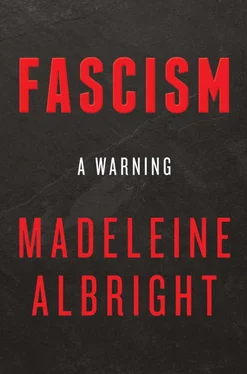Fifteen
President of the United States
THE UNITED STATES HAS BEEN A SOURCE OF HOPE TO MILLIONS since before its founding. Writing from Paris in 1776, Benjamin Franklin assured the Continental Congress, “All Europe is for us. Tyranny is so generally established in the rest of the world that the prospect of an asylum in America for those who love liberty gives general joy, and our cause is esteemed the cause of all mankind.” During the Civil War, especially in the wake of the Emancipation Proclamation, idealists from many corners of Europe crossed the Atlantic to join the crusade against slavery. In New York, an international brigade named in honor of Italian general Giuseppe Garibaldi was formed to assist the army of Lincoln. Declared Garibaldi: “The American question is about life for the liberty of the world.” A less rosy assessment, from a very different source, came many years later: “The beginnings of a great new social order based on the principle of slavery were destroyed by that war,” lamented Adolf Hitler, “and with them also the embryo of a truly great America.”
Hitler fantasized that the United States so fully shared his racist views that it would ultimately side with the Third Reich. Nazi writers regularly pointed to America’s anti-Asian immigration quotas and bigoted Jim Crow laws to deflect foreign criticism of their own discriminatory statutes. Even the German quest for Lebensraum found its model in America’s westward expansion, during which, as Hitler noted, U.S. soldiers and frontiersmen “gunned down… millions of Redskins.”
Still, the story of America’s birth—wrapped in the swaddling cloth of Jefferson’s prose—has always been powerful enough to overcome internal contradictions. Americans have never ceased to learn from mistakes, in part because every generation has had the ideal of equality against which to measure itself. Thus, Hitler underestimated the United States, and for that error, he paid an enormous price.
When, in the spring of 1944, I was in England with my family, we had our first close-up look at U.S. troops. In their leisure hours, the soldiers strode jauntily about, trailed by children like me calling, “Hey there, Joe, got any gum, chum?” For weeks, the GIs could be seen in their olive-green uniforms, driving camouflaged jeeps, lorries, and the peculiar-looking amphibious vehicles known as Ducks. When the time came to fight, they were ready. In the early-morning hours of June 6, Operation Overlord, the Normandy invasion, established five beachheads along a fiercely contested fifty-mile stretch of the French coast. Despite a chilly northwest wind, 160,000 troops moved across the Channel in a flotilla so thick with ships and boats that it seemed possible almost to walk from England to France. In the sky, more than eleven thousand allied warplanes weakened enemy defenses and guarded against attacks from above.
It is in such testing moments that a country discovers its own purpose and carves out a singular identity in the eyes of the world. That is also when expectations of ongoing leadership are forged. From “Give me liberty or give me death” to “Mr. Gorbachev, tear down this wall!” the United States has been counted on to speak as John Quincy Adams said early on, “though often to heedless and often to disdainful ears, the language of equal liberty, of equal justice, and of equal rights.”
Such is the grand tradition and grave responsibility that every U.S. president inherits upon taking the oath of office. Each answers that call in a way reflecting that particular leader’s character, integrity, and seriousness of purpose.
Donald Trump is fond of reciting a poem about a foolish but tenderhearted woman who goes for a walk one winter’s day and comes across a half-frozen snake. She kindly brings the reptile into her home, lays it beside the fire, feeds it milk and honey, and restores it to health. Pleased to see the snake doing well, she picks it up and is bitten on the chest. Dying, she asks her patient why he has been ungrateful, and is told, “Shut up, silly woman, you knew damn well I was a snake before you took me in.” Basking in laughter and applause, the president asks his audience, “Does that explain it, folks? Does that explain it?” Then, he adds, “We’ll build the wall, folks. Don’t even worry about it. Go to sleep. Go home, go to sleep.”
Decades ago, George Orwell suggested that the best one-word description of a Fascist was “bully,” and on the day of the Normandy invasion, Franklin Roosevelt prayed to the Almighty for a “peace invulnerable to the schemings of unworthy men.” By contrast, President Trump’s eyes light up when strongmen steamroll opposition, brush aside legal constraints, ignore criticism, and do whatever it takes to get their way.
Since June 2016, Rodrigo Duterte has been the head of government in the Philippines. In that time, he has gained global notoriety for his reliance on police and civilian vigilantes to kill suspected drug dealers. He insists that his shoot-first policy is tough on crime, but the knife-edge of that toughness falls on what is already the most disadvantaged portion of his country’s population. Per news reports, the number of Filipinos slain by police during Duterte’s presidency exceeds ten thousand. We don’t know, and neither does he, how many of the dead carried weapons, how many were guilty of peddling drugs, and how many were gunned down by mistake or for no reason at all. We do know that Duterte has concentrated his fire on the streets and that the people who profit most from the drug trade live in penthouses or in walled estates. We know as well that the police solicit bribes to remove names from their kill lists, that many families of the victims are so poor they must rely on charity to buy coffins, and that Duterte plays the whole sad issue for laughs, urging the public to invest in funeral parlors and bragging, “I’ll supply the dead bodies.” Duterte has told police officers who are on trial for abusing their authority to go ahead and plead guilty so he can pardon and promote them. Early in his presidency, Donald Trump phoned Duterte to congratulate him for doing an “unbelievable job.”
In 2013, Egyptian general Abdel Fattah el-Sisi seized power in a military coup. As president, he turned the clock back on the Arab Spring and installed precisely the kind of politically airless regime that Tahrir Square demonstrators thought they had rid themselves of two years earlier. Today, once more, an Egyptian government is censoring public debate, using lethal force against protesters, harassing journalists, outlawing political opposition, and filling its jails with tens of thousands of dissidents—some secular, some religious. There is no more reliable formula for generating future terrorists. In Donald Trump’s view, el-Sisi is “fantastic.”
The Kingdom of Bahrain systematically discriminates against its Shiite Muslim majority, robs dissidents of their citizenship, maintains a tight lid on civil society, and refuses to tolerate serious political opposition. The United States and Bahrain share important strategic interests but the relationship has been strained, in the past, by disagreements over human rights. In 2017, President Trump assured the country’s monarch that “there won’t be strain with this administration.”
In April of that same year, President Erdoğan narrowly won a popular referendum to amend the Turkish constitution, add to his powers, and enable him to remain in office, potentially, until 2029. Most democratic leaders found this outcome regrettable. Trump’s response was to reach for the phone and laud Erdoğan on his win.
The president’s admiration for autocrats is so ingrained that it extends to men even less worthy of respect than these. To Trump, Saddam Hussein “was a bad guy, a really bad guy. But you know what he did well? He killed terrorists. He did that so good. They didn’t read them the rights. They didn’t talk. They were a terrorist, it was over.” As for Kim Jong-un: “You have to give him credit. How many young guys—he was like 26 or 25 when his father died—take over these tough generals, and all of a sudden… he’s the boss. It’s incredible. He wiped out the uncle. He wiped out this one, that one. I mean, this guy doesn’t play games.” Finally, there’s Vladimir Putin: “a man so highly respected within his own country and beyond.”
Читать дальше
Конец ознакомительного отрывка
Купить книгу












